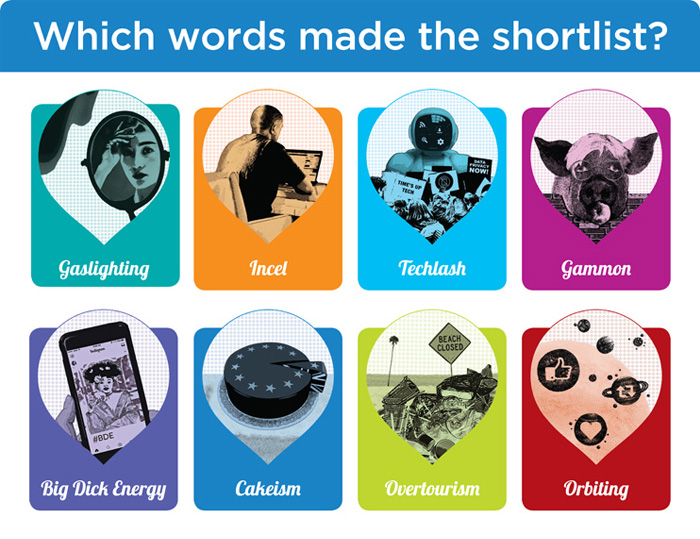Word of the Year 2018
Word of the Year 2018
The adjective toxic is defined as ‘poisonous’ and first appeared in English in the mid-seventeenth century from the medieval Latin toxicus, meaning ‘poisoned’ or ‘imbued with poison’.
But the word’s deadly history doesn’t start there. The medieval Latin term was in turn borrowed from the Latin toxicum, meaning ‘poison’, which has its origins in the Greek toxikon pharmakon – lethal poison used by the ancient Greeks for smearing on the points of their arrows. Interestingly, it is not pharmakon, the word for poison, that made the leap into Latin here, but toxikon, which comes from the Greek word for ‘bow’, toxon.
Why was toxic chosen as Word of the Year?
The Oxford Word of the Year is a word or expression that is judged to reflect the ethos, mood, or preoccupations of the passing year, and have lasting potential as a term of cultural significance.
In 2018, toxic added many strings to its poisoned bow becoming an intoxicating descriptor for the year’s most talked about topics. It is the sheer scope of its application, as found by our research, that made toxic the stand-out choice for the Word of the Year title.
Our data shows that, along with a 45% rise in the number of times it has been looked up on oxforddictionaries.com, over the last year the word toxic has been used in an array of contexts, both in its literal and more metaphorical senses.
Drawn from our corpus, the top 10 toxic collocates for the year – that is, words habitually used alongside toxic – are indicative of this.
Top 10 ‘toxic’ collocates in 2018
by absolute frequency
Chemical
Masculinity
Substance
Gas
Environment
Relationship
Culture
Waste
Algae
Air
Sourced from the Oxford corpus
Beyond the more usual substance warnings, this year toxic chemical has had particular significance as the nerve agent poisoning of a former Russian intelligence officer and his daughter in Britain sent shockwaves around the globe. Ongoing international attention to the case, including rising concern over who has access to the world’s toxic chemical stockpiles, ensured that ‘chemical’ topped the list of words most frequently seen alongside toxic in 2018.
Similarly literal and deadly are toxic substance, toxic gas, and toxic waste, with the latter especially becoming a focal point as the US seeks to combat the spread of toxic waste in the wake of hurricanes and people speak out against businesses burning toxic waste, notably in India.
This burning of toxic waste, resulting in the release of toxic gases, has been identified as one of a number of causes of toxic air. Air pollution has rapidly become a prime public health concern, and global attention reached a high in October 2018 when the World Health Organization published its report into the quality of air breathed by children worldwide. The report described this pollution as toxic air, plainly and potently signifying its poisonous nature, and with the aid of international media coverage, served to consolidate the association of toxicity and poor air quality in our lexicon.
Such pollutants are not only dangerous to our health, but to the health of our environment, and one of the many environmental issues discussed this year has been the toxic algae disaster in Florida, US. Thanks to a central role in the state’s Senate mid-terms race, toxic algae garnered so much commentary that ‘algae’ featured as the ninth-most frequently seen toxic collocate for 2018.
The term toxic environment itself, however, has been more frequently used in reference to harmful workplace environments and the toll this takes on the workforce’s mental health. From overly demanding workloads to outright sexual harassment, many companies have been exposed as crucibles for such toxic culture this year, which has seen mass walkouts at Google, the fashion mogul Philip Green disgraced, and the Speaker of the House of Commons accused of misusing his official powers to cover up allegations of bullying in Westminster.
Toxic relationships are not exclusive to the workplace, however, and whether its partners, parents, or even politicians, this year has seen so much discussion of ‘poisonous’ relationships across our society that ‘relationship’ is the sixth most-seen toxic topic for 2018. One reoccurring element in such discussions has been toxic masculinity.
Our corpus data shows that, after ‘chemical’, ‘masculinity’ is the most-used word in conjunction with toxic this year. With the #MeToo movement putting a cross-industry spotlight on toxic masculinity, and watershed political events like the Brett Kavanaugh Senate judiciary committee hearing sparking international debate, the term toxic masculinity has well and truly taken root in the public consciousness and got people talking in 2018.

